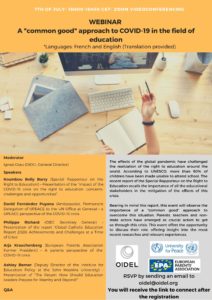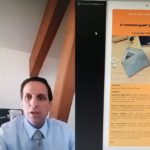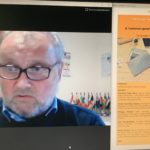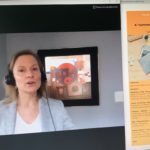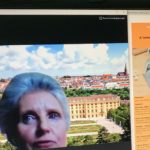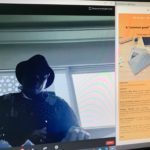Webinar: A "common good" approach to COVID-19 in the field of education
Last Tuesday July 7, OIDEL organized a new webinar about the COVID-19 and its impact on the exercise of the right to education worldwide. With Ignasi Grau as a mediator, different panelists and attendees joined via Zoom to address the importance of education in society, the challenges that the pandemic poses to education and the right way to address the situation, taking into account factors and actors that are not receiving the necessary attention. For OIDEL, the topics reviewed are of great importance since the pandemic has represented a threat for the right of education, as well as a set of new opportunities to reduce the gap of inequality among children
First of all, David Fernández talked about education as a part of the culture of peace, stressing that it leads to mutual understanding and respect, for which the principle of dialogue and cooperation is really important. On the contrary, if there is a lack of access to education, inequalities and poverty increase.
Phillipe Richard, representing the Catholic schools talked about the issues that were already present before the pandemic and the changes in education that should be put in place. There were already huge inequalities, so the pandemic has not had the same impact in some parts of the world as in others, having to pay special attention to the poorest countries. Moreover, the lack of funding is depriving many students of access to education and leading to the closure of schools. He claimed that these inequalities reflect that education is interconnected with other human rights, and that the involvement of all actors (government, teacher unions, families, learners) will lead to quicker responses to the consequences of the crisis.
Ashley Berner, Deputy Director of the Johns Hopkins Institute for Education Policy, presented 4 policy recommendations on the U.S. education system for reopening k-12 schools for example reconfiguring school calendar to increase the instruction time and not to lose academic tractions, but also adopting staffing models that ensure students are taught by teachers with deep subject-matter and instructional expertise, while other educators provide one-on-one academic and social-emotional support. She also mentioned some good practices taken in the U.S. to combat the consequences of COVID-19, such as broadcasting lessons on TV, public funding to deliver instructional coaches to teach and support kids or the NYC partnership schools helping fund tuition.
Arja Krauchenberg on behalf of the European Parents’ Association claimed that parents are the most impacting actors in the education of the children and unfortunately, they are often forgotten when analyzing learning and well-being. She considers that it is necessary to incorporate new approaches to face the crisis and improve the structure of the education system. For instance, the active involvement of parents is very important, cooperation between all stakeholders (children, parents, teachers, wider community, other school staff) is key, funding is crucial to assure the exercise of the right to education for all, respecting diversity and improving communication skills lead to mutual understanding and development of empathy, and learners should be put in the center of education.
Special Rapporteur Koumbou Boly Barry concluded developing the lessons learned, stressing some important points: human rights are interconnected and should be analyzed together, communication among teachers, parents and the state is crucial, the capacity to decentralize the education structure and to put students in the center is key, and more importance to psychosocial support should be given to help everyone face this crisis.
In conclusion, all panelists agreed that cooperation among all stakeholders is necessary to provide rapid and effective action and that a change in the structure of education systems is needed to respond to the needs of students, favoring both the right to education and many others.
Link to watch our webinar in our Youtube channel: here


